Hello Millenial Readers,
The first round of the Kenyan elections has concluded, with almost 14 million Kenyans exercising their political rights. We are now moving in the direction of election petitions. I must first start by thanking Kenyans for keeping the peace this time around. Previously, such periods were scary and distressing, but this time most individuals returned to their businesses almost immediately. It signifies that as a country, we are maturing and have learned from our failures.
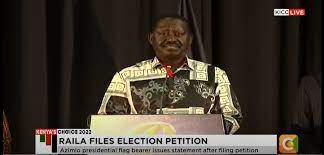
The petition case is now in the hands of seven capable Supreme Court Justices, to whom the constitution has delegated the authority to resolve presidential election disputes. Today, I want to discuss election petitions in Kenya and provide some background information on the procedure.
After a close race against former Prime Minister Raila Amollo Odinga, the Chairman of the Independent Electro and Boundaries Commission, Mr Wafula Chebukati, declared Deputy President William Ruto as the President-Elect on August 15, 2022. Mr Odinga however, disputed the results, calling them “Null and Void,” in a press conference held after the results were announced. As a result, most of us knew that he would be headed for the courts, and finally, the moment arrived.
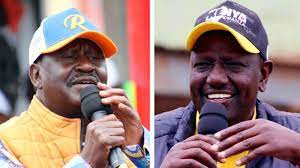
The Resolution of Presidential Election Disputes
The Kenya Constitution of 2010 establishes highly detailed processes for resolving election disputes in the country. The election petition is a formal mechanism for contesting election results in Court and can be filled by a candidate or anyone who wants to challenge any aspect of the electoral process. However, the presidential election petition frequently receives the most attention.
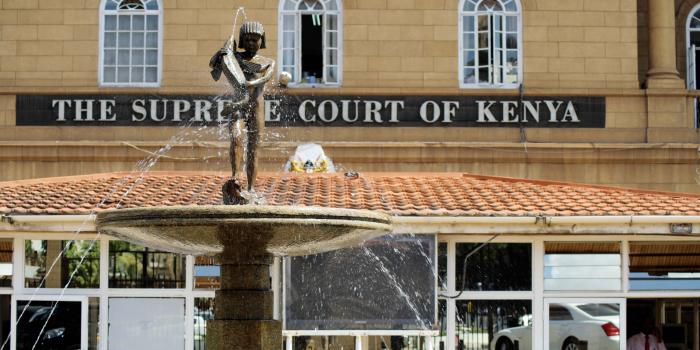
“By virtue of Article 163 (3) of the Constitution of Kenya, 2010, jurisdiction (the power to hear and determine) a presidential election petition is vested in the Supreme Court,” according to a Kenya Law Organization article. This Supreme Court jurisdiction is both exclusive, in the sense that no other court has the authority to hear such a dispute, and original, in the sense that the dispute is filed in the Supreme Court in the first instance, as opposed to appellate jurisdiction, in which a court hears a dispute on appeal from another court.”
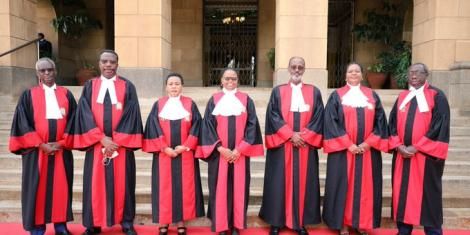
Eight petitions have already been filled in this election relating to the August presidential polls. The constitution calls for a seven-judge panel to hear the case. The bench is now made up of the First Kenyan Female Chief Justice, Martha Koome, Deputy Chief Justice Philomena Mwilu, Justice Mohammed K Ibrahim, Justice Njoki Ndung’u, Justice Smokin Wanjala, Justice Isaac Lenaola, and Justice William Ouko.
The Election Petition Timeline
Individuals must file an election petition seven days after the election results are announced. As a result, we saw petitioners rushed to file their cases on Monday 22nd of August 2022, including Mr Odinga, who has already been down this road before- he petitioned the Supreme Court twice, in 2013 and 2017, when the presidential election was annulled.
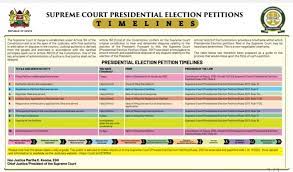
According to clause (1), the Supreme Court must hear and decide the petition within fourteen days of its submission, and its decision is final.
Why is the petition completed so quickly?
According to the Kenya Law Organization, the Court stated that while the electoral process had resulted in a winner, the president-elect could not take office until the case was handled. A lengthy holdout of a president-elect or a retiring president would have created a climate of anticipation and uncertainty that would not have served the public interest. The prompt resolution of this disagreement was critical.
Delaying such a process may increase tensions and provoke violence. As a result, the procedure must be completed as soon as possible. This is likely why the opposing parties are amassing armies of top-tier lawyers to assist them in this lawsuit, which takes only fourteen days.
Furthermore, given the short time frame for issuing the ruling, the judges first present a summary of the judgment and their decision. However, they must provide precise reasoning for their decisions in the latter days.
What are the Possible Petition Outcomes?
As we await the start of the legal battles, here are some of the most likely results of the hearing:
• The Court can uphold the election if it finds that it was conducted in accordance with the constitution.
• It can criticize the process but conclude that there were not enough grounds to overturn the result.
• It can invalidate the election result and order a new election within 60 days.
Whatever the Supreme Court’s decision, Kenyans must maintain the calm they have demonstrated over the last two weeks.
That’s it on today’s post, I hope that you have learned a lot, keep it The Millenial News for more Kenyan election 2022 updates.
Peace and Love.
Fabian✌✌✌
